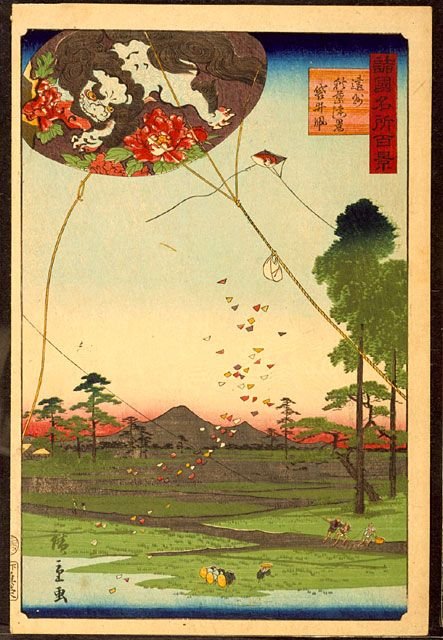Sleeping Boy ~ Haiku of Japan
凧抱たなりですやすや寝たりけり
tako daita nari de suya-suya netari keri
holding his kite
sleeping
peacefully
—Issa
(trans. David LaSpina[1])

(Print by Hiroshige)
What a delightful scene. I think all parents have seen this action in their own kids at least a few times. I know I have: my kids too often go to sleep clutching their favorite toys.
Kite (tako, 凧) is a kigo (season word) for all of the spring. It can also, depending on the haiku, be a New Years kigo. The old Japanese calendar began the New Year with Spring, so you can see a lot of overlap between the two in older haiku. In fact, although modern saijiki[2] put tako for all spring, traditionally it would have referred specifically to the New Year season and not the rest of spring.
You see in the Edo period (1603–1868), flying kites—called takoage (凧揚げ)—was not allowed except during the New Year holiday. Therefore, it quickly became a fun game that kids looked forward to all year.
You can hear mention of this activity in the traditional New Year's song oshōgatsu (listen for the words "tako age". Or, just watch the subtitles)
As you might expect, the activity is not as common today. Kids would rather stay home and play their Nintendo Switch. Even so, it is not unusual to see kids flying kites around the holiday.
Thank you for reading. :)
If you enjoyed this post, please like and reblog. Also be sure to follow me to see more from Japan.
My expertise is Japanese poetry, especially haiku, but I'm also quite keen on Japanese history. Might also share some photos sometimes too. Let me know if there is anything about Japan you would like to know more about or would like to see.
 | David LaSpina is an American photographer and translator lost in Japan, trying to capture the beauty of this country one photo at a time and searching for the perfect haiku. |